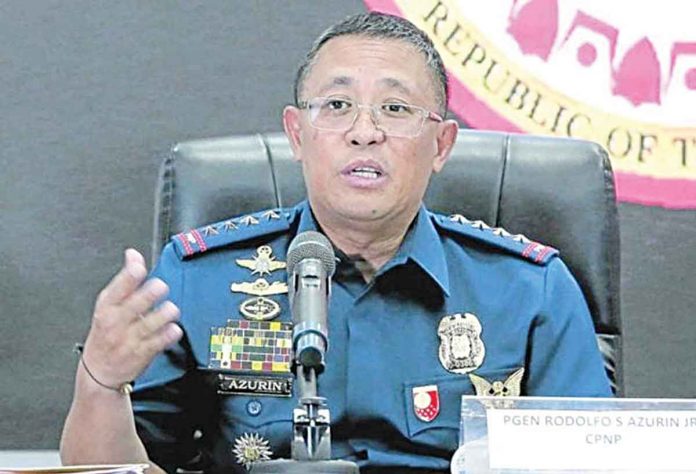
MANILA – Philippine National Police (PNP) Gen. Rodolfo Azurin Jr. on Monday admitted that the morale of some of the ranking police officers was dampened as they undergo “trial” for alleged links to the illegal drug trade.
Azurin said 929 or 97.48 percent of the 953 police colonels and generals in the country have so far heeded the government’s call for them to tender their courtesy resignations and subjected themselves to an evaluation that will determine whether they have ties to criminal drug syndicates.
But despite the PNP nearing its goal of all its ranking officials voluntarily stepping down from their posts, Azurin said some of their top cops have said that their morale was negatively affected by this “very radical” approach in purging the police ranks of drug links.
“May nagsasabi na low morale sila [Some say they have low morale], because the PNP is now on trial. But if you are going to look at the figure, 97 percent shows how responsive our third-level officers are,” Azurin said in a news briefing.
He pointed out that the senior police officers who have submitted their courtesy resignations “want their name to be cleared because they want to, later on, climb the leadership ladder unblemished as far as their involvement in drugs is concerned.”
Azurin argued that passing the evaluation would help them gain their “moral ascendancy” since the internal cleansing initiative of the PNP will soon go down to the lower ranks.
“You can start imposing discipline, imposing some policies and some rules to our people on the ground because they’re more involved with the community. It might affect the relationship we want to build with the community in our anti-criminality campaign, not just on illegal drugs,” he said, speaking in a mix of English and Filipino.
Tracing top cops’ reservations
With only 24 top-ranking police officers left to file their courtesy resignations until January 31, Azurin pointed out that one of the most common reservations he has heard among PNP officials was the chance of being mistakenly tagged for involvement in illegal drugs.
“Sinasabi nila, ‘sir, ito lang po ang career namin na pinagtrabahuhan namin for the last 30 years, so nandoon iyong parang agam-agam na kahit alam namin na wala kaming kasalanan, baka biglang magkamali iyong mag-e-evaluate at mag-a-assess sa amin,” he said.
Azurin noted that another concern stirring worries among senior police officers are that their personal issues and concerns with members of the five-member committee, which is tasked to conduct the evaluation, may be used against them.
With this in mind, the country’s top cop – among the first to turn in his courtesy resignation – reiterated the PNP’s demand for the evaluating panel to “be objective, fair and circumspect in all their undertakings during the process.”
‘Test of individual character’
While he acknowledged the hesitation of some top PNP officers, Azurin said they should still submit themselves to the evaluation, which he called a “test of individual character,” especially if they intend to climb the police ranks.
“Napakahirap na bawat sa pag-angat mo, laging may isyu na ibinabato at ibinabalik sa’yo. This time, once you’re evaluated about sa involvement sa illegal drugs, dapat wala nang isyu na ibabato sa iyo,” he said.
Azurin, one of the prime movers behind the quit call for senior police officers, said claims of top cops’ involvement in illegal drugs are “unfair accusations against third-level officers because they work hard for whatever rank they are in now.”
“They deserve all the respect [and] opportunities. They should be given a fair chance to reach the top or to be given more responsibilities in the future as future officers who will soon take the helm of the PNP,” he added.
After being evaluated by a five-member committee independent from the PNP and the Department of the Interior and Local Government, the names of top-ranking police officers with alleged drug ties would then be turned over and screened by the National Police Commission (Napolcom), where Interior Secretary Benjamin Abalos Jr. sits as chair and Azurin as ex-officio commissioner.
The Napolcom, according to Abalos, may amend or trim down but not add to the list of names, which it would later submit to President Ferdinand Marcos Jr. for necessary action. (Beatrice Pinlac © Philippine Daily Inquirer)






